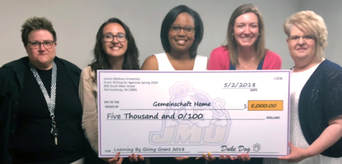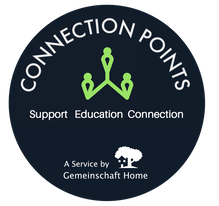|
Where Are They Now? Former Resident Spotlight  Former resident, Donte Malone Former resident, Donte Malone Harrisonburg, VA - Donte Malone arrived at Gemeinschaft Home early this summer, and he successfully completed the program in August. Now, he has returned to the Norfolk/Tidewater area, moved into a new apartment and found temporary employment as a landscaper, while he searches for a full-time position. The transition from prison, to Gemeinschaft Home, to living independently has included both successes and setbacks. For example, one of the greatest challenges he faced during his time in the program was the passing of his mother. However, Malone’s passion for writing, a practice he established a number of years ago while incarcerated, gives him an emotional outlet as well as a way to reflect on his life experiences. Shortly before his release from prison, Malone wrote down a collection of original adages, sayings, and quotations, that encapsulate his life philosophy and serve as a springboard for conversations into a range of subjects, including parenting, manhood, and addiction. He had hoped to someday publish the collection, using an oil painting that a fellow inmate created—that depicts Malone watching over his children on a sunny day at the beach—as the book’s cover. One of the greatest successes Malone achieved during his time in the program (with the help of a devoted intern) was the printing of his quotations—in the form of small 20-page booklet—with the oil painting as the cover art. So far, he has sold dozens of copies to individuals interested in hearing about his life’s journey, including his experiences with addiction and incarceration. At first, he called the collection “My Father’s Wisdom,” referring to Malone’s perspective as a parent, but ultimately, he decided to change the title to “My Mother’s Wisdom,” as a tribute to her, especially because much of the knowledge he shares originated with her. He is currently working on another collection of writings. For more information, visit his Facebook page. Selected examples: “If you don’t free your mind, your body will stay locked up.” “Sometimes it’s more difficult to open a book than it is to read it.” “To lean on forgiveness, you have to stand on understanding.” “If you can’t get along with yourself, why would you think anyone else could?” Last spring, undergraduate students studying social work, helped develop a grant proposal awarding $5,000 to Gemeinschaft Home.  By Paige Riddle (summer intern) Harrisonburg, VA - Gemeinschaft Home recently participated in a collaborative grant-writing process with students from the Grant Writing for Agencies class at James Madison University. The process allows groups of students to join local nonprofit organizations in applying for a $5,000 grant. The grant funding comes from the Learning by Giving Foundation, which was founded by Doris Buffet. The main goal of the foundation is to engage students at institutions of higher education in the United States about philanthropy. Some other university partners of the foundation include Columbia University, Ohio University, and Stanford University. Each class distributes $10,000 to nonprofits in their community with the grant writing processes they deem appropriate for their learning goals. I joined two other students, Hayley Jenkins and Courtney Fennel, to collaborate with Gemeinschaft Home. Public Relations and Outreach coordinator, Dr. Jennifer Jacovitch, introduced us to the organization and served as our primary contact for the process. My experience with Gemeinschaft Home was incredibly eye-opening. I did not expect to feel so welcomed and familiar at the organization after only a few meetings, and I certainly did not expect to feel so attached to the work we created together. Dr. Jacovitch shared her expertise with the population and the organization, but she trusted us with the actual writing of the grant. Our proposal focused on a College Outreach Program to expand the organization’s community presence. Our classmates were extremely receptive to this concept, and we placed first out of nineteen organizations, awarding Gemeinschaft Home $5000 to implement the proposed program! College Day Open House The majority of students in the Grant Writing for Agencies class do not see the results of their proposed grant project, as the funding is distributed after the class ends. My internship at Gemeinschaft Home this past summer allowed me to see the plans shift and settle with the needs of Gemeinschaft Home and the community. Our current plan is to host an Open House for young adults in the Harrisonburg community and creating materials for promotion and educational presentations. The Open House will take place at Gemeinschaft Home on Friday, September 21 from 11:00am to 4:00pm. The goal of this event is to reach out to college-age adults who are interested in learning about the population we serve, the nonprofit sector, and Gemeinschaft Home. We will offer food and games, dialogue with staff and residents, and information on ways to serve and advocate for ex-offenders. The main idea behind the Open House is to address the stigma that is associated with ex-offenders by offering college students like me an opportunity to engage comfortably with members of the population. I shared with Gemeinschaft staff how surprising it was to walk onto the Gemeinschaft property and immediately feel safe—despite some early preconceived notions and fears. I want others to experience this important shift in perception, too. This is a rare opportunity for many to confront their assumptions prior to their entrance into the workforce. More importantly, it is an opportunity for students to connect with a significant portion of every community that needs advocacy and to identify ways to get more involved. In addition to its existing programs for individuals just recently released or diverted from incarceration, Gemeinschaft Home now provides a vital source of information and support to area citizens.  To learn more, visit our website. Harrisonburg, VA - Over the summer, Gemeinschaft Home launched its newest program, Connection Points, a service that is free and open to the public and offers a unique resource in the local community. The program provides a safe, educational, and supportive environment for individuals who know (care for) someone affected by addiction. Such individuals are often discouraged from talking openly about their situation, and they battle stigma, judgement, and stereotypes as they attempt to discuss the addiction of a loved one or to just reach out for help. Connection Points is Gemeinschaft Home’s response to those oppressive patterns, and a key feature of the program is its confidentiality policy, which asks participants to keep the names and dialogue exchanged in a session within the confines of each meeting. Creators of the program, Jumar Peterson and Brandi Smith, blend their own personal experience with evidence-based practice, to offer a curriculum that facilitates a greater understanding of addiction among the program’s attendees. While stressing the philosophy “addiction does not discriminate,” they encourage participants to take an active role in the group, which include sharing personal experiences or choosing to abstain from sharing while listening to others. There is also ample time in each session for attendees to ask questions and to respond to discussion on a range of relevant topics. New members are welcome any time, and we strongly encourage everyone—not only those who are struggling with a loved one’s addition—to take advantage of this vital community resource. Connection Points is free and open to the public. Sessions are held every other Wednesday evening, from 5:00pm to 6:00pm, and meet in the Bender Building, located on Gemeinschaft Home property (behind the main house). Parking is available. Following the Journey of James Schultz  Harrisonburg, VA - Entering the front door of Gemeinschaft Home, visitors first encounter the front office, a reception area just off the main foyer. There is a shift supervisor on duty at the front desk, twenty-four hours a day, ready to handle any issue that arises. Generally speaking, the shift supervisor keeps order in the house and oversees the daily movements of residents. More specific tasks include: fielding all phone calls coming into the organization, conducting building/grounds inspections, administering drug/alcohol screens, and receiving guests and visitors. It’s a job that requires patience, flexibility, and the capacity to problem-solve on the spot. James Schultz has been a shift supervisor for about four years, and he approaches the job with a blend of humor and humility. His gentle demeanor, balanced with his direct style of communication, give him an ethos of authority but not overbearingness, and he maintains a solid rapport with residents and staff members alike. The degree of commitment and patience that Schultz demonstrates in his work is reflective of his own past experiences, which include being a former resident of Gemeinschaft Home. Understanding their perspectives, based on firsthand knowledge, not only informs how he interacts with the residents, but also confirms his belief in the efficacy of Gemeinschaft Home’s mission. When Schultz was released from prison in the late 1990s, he explains that he was given a choice—to return to his hometown and live with his grandparents or to apply for the program at Gemeinschaft Home. While he was incarcerated, he had heard fellow inmates speak about the program offered at Gemeinschaft Home, and he was motivated by the prospect of working on his own, becoming independent and supporting himself. He knew that living with his grandparents would create an environment in which he would not be forced to work or support himself. Not because of a toxic situation—but exactly the opposite—he would have loving family members to provide unconditional support, yet they also would be enabling him to stay in the same spot, becoming more dependent and less capable of self-support. He points out that he was grateful for his family’s support, but that after “everything that I had put them through, it was time I learned to stand on my own with a solid foundation and move forward with my life.” His decision to complete the Gemeinschaft Home program was crucial, adding, “I was able to obtain employment and maintain keeping it, to budget my finances, and to start my life on a new—more promising—path for the future.” Then, in July 2013, Schultz faced another choice. He was living in Buford Georgia. He had lost employment, depleted his savings, and was struggling to keep up with his bills. He recognized that he needed help, and the place where he had gotten back on his feet more than a decade earlier—Gemeinschaft Home—came to mind. He was unsure about what to expect, but he took a chance and reached out to the Executive Director, Sharon Ringgold. She offered him a bed in the Self-Pay program, which would allow him to live at Gemeinschaft Home again, to participate in the structured environment of the house, to find steady employment, and to get back on his feet. His choice to return paid off, and soon thereafter, he moved into a nearby apartment. During this time, Schultz had established a positive relationship with the residents and staff of Gemeinschaft Home, so much so that Ringgold invited him to apply for the position of shift supervisor. Today, he brings years of insight to the job, to the great benefit of every resident who arrives in the program. Of course, there are challenges in every job, and things are no different for Schultz: “The biggest challenge is to see and know that a resident is on the wrong path, but still trying to help get him back on track,” and feeling unsuccessful, adding that “they have to want it for themselves, and all I can do is try to help guide them.” At the end of the day, Schultz urges residents to see the bigger picture, to understand those behaviors that lead in a positive direction versus those that lead back to incarceration. Schultz explains, “I always tell new intakes that this house has rules and regulations that they may dislike or even disagree with, but the overall structure is there to help them get into a healthy daily routine that will help them transition.” The greatest reward for Schultz is to see a former resident who is transitioning well and is grateful for Gemeinschaft Home’s role in that process. Speaking from personal experience, Schultz can offer residents who have completed the program the following advice: “I say just because you’re exiting doesn’t mean the house will abandon you; you can call or stop by to talk to anyone if you feel you might be struggling. We are here to help you even after exiting the program.” Schultz is proud of his successful transition but is quick to say that he is far from perfect, “I still make mistakes, and I’m still learning as I continue my own journey.” His willingness to acknowledge his own humanity and that of others is what makes him a treasured asset to Gemeinschaft Home and to the lives he touches every day. |
Archives
August 2023
|